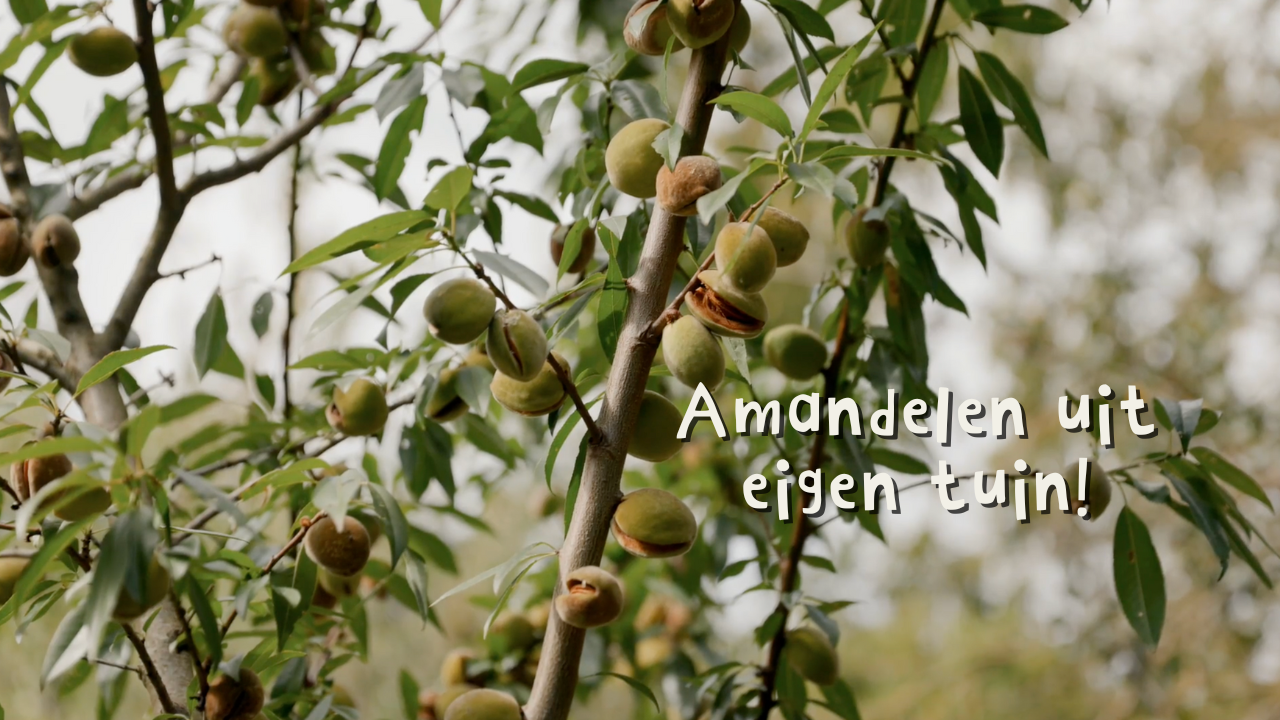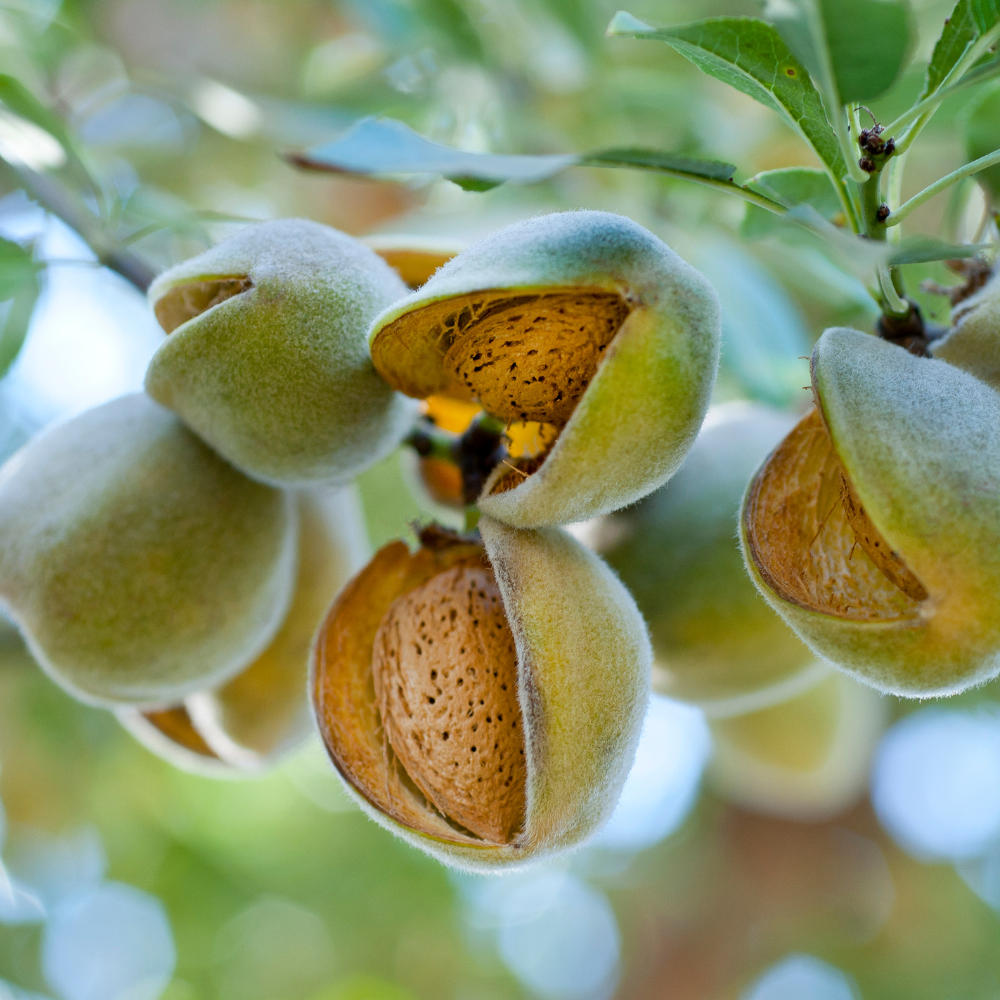Please note: this is bare root planting material
Almond tree (Prunus dulcis 'Robijn') - 1 plant with bare roots
'Robijn' is a beautiful, self-pollinating almond variety that thrives in our climate. The tree blooms early in spring with stunning pink flowers that are not only ornamental but also attract the first bees. After flowering, the almonds develop with their characteristic hard shell and wonderfully aromatic kernel.
The nuts are full of flavor and are used both fresh and dried. They're perfect for baking, pastries, almond paste, or simply as a healthy snack. 'Robijn' is also winter-hardy and can grow into a medium-sized tree of 4-5 meters in the ground.
Key Features
- Harvest period: August-September
- Taste: sweet, nutty
- Location: sun to partial shade
- Height: 4-5 m
- Planting distance: 3-4 m
- Self-pollinating: yes (but planting a second tree increases yield)
- Height on delivery: 60-80 cm (without roots)
Bare root, what does that mean?
Bare-root means that a tree or shrub is delivered without a pot and without soil around the roots. The advantage is that bare-root plants are less expensive than potted plants. However, the planting period is limited to the winter months. Before planting, it's recommended to soak the roots in water for a few hours and then immediately place the plant firmly in the soil. Bare-root plants are always sold without leaves because otherwise the bare roots will dry out. It's best to transplant the plant to the garden as soon as possible, but temporarily repotting it in a pot is also possible.
Tips and care:
- Planting: November to March
- Pruning : In the early years, keep the crown open to allow light and air to reach the branches. Choose 3–4 sturdy framework branches and remove competing shoots.
- Organic/non-organic: This plant material comes from a small-scale grower without an official organic certificate. But don't worry, we're certain it's pesticide-free.
- Open ground or pots: you can grow all fruits in pots; the bigger the pot, the better they'll do. They'll always grow better and produce more fruit in the open ground.
- Type en soort
- Bare root
Dispatch
Dispatch
We ship your order within 1-2 business days*. For orders over €75, you'll receive one free shipment. Shipping is available from €3.95. All orders are shipped as a parcel with a track and trace code, so you can track your order at any time. Read more about shipping costs in our FAQ.
Delivery time pre-order
Your order will be shipped from the specified delivery date. This also applies if you combine a pre-order with in-stock products. If you want to receive the in-stock products immediately, select "Multiple deliveries" as the shipping method.
Sjef van Dongen - Fruitzforlife
Sjef van Dongen - Fruitzforlife
In 2020, Sjef and Wilma van Dongen transformed Sjef's uncle's pig farm into an agroforestry nursery . What began as experiments in their garden, Fruithof De Brand , has grown into a unique 6-hectare project where nursery and food forest come together.
Their focus is on the best, disease-resistant, and flavorful varieties —from mulberries, pawpaws, and leaf curl-free peaches to walnuts, chestnuts, and grapes. This creates a collection of plants that are not only beautiful and productive but also contribute to increased biodiversity.
Sjef combines a pragmatic approach with years of experience in the agricultural industry. This allows him to inspire and provide practical guidance to individuals, communities, and farmers alike in planting trees and shrubs. Using innovative techniques like Air-Pot® container cultivation, he also ensures strong planting material ready to grow into healthy, robust trees.
Their mission? To make people healthier and happier by connecting them with an environment full of edible trees and shrubs – a tangible step towards a greener future.
Cultivation method
Cultivation method
At FruitzforLife, they operate their 6-hectare nursery with a clear conviction: pesticides are unnecessary . They grow strong, resilient plants that are in harmony with their environment.
They grow a large portion of their plants themselves. They also collaborate with families and cutting companies in the Netherlands, France, Poland, and Germany who propagate their plants. This creates a network of growers who share the same vision.
Their nursery model allows farmers and families to plant fruit and nut trees for their own use, while simultaneously growing additional trees for sale. This way, they contribute to a greener future and generate additional income in the first few years after planting.
FruitzforLife operates in an environmentally conscious way : from wood fiber as a growing medium (instead of coir), recycled and reusable pots, and solar-powered electric vehicles to machines that run on biodiesel. Their application for Skal certification is also in progress.
Their nursery is located on two former intensive livestock farms. Where chickens, pigs, and cows once stood, trees and shrubs now flourish. Together with the former farmers and a dedicated team, they are building a chain of families committed to sustainability. This is how FruitzforLife is gradually changing the future – with an eye for people, nature, and future generations.




